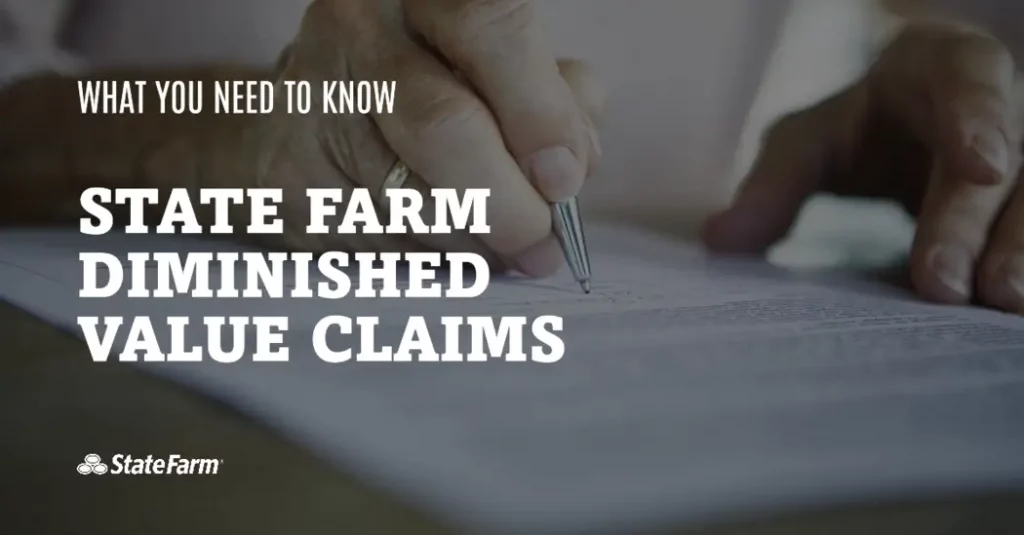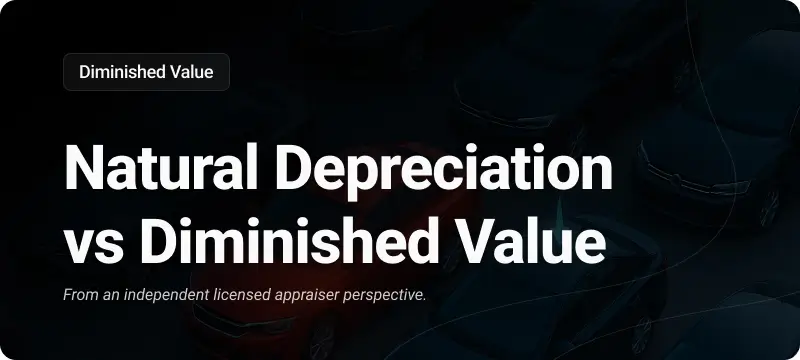When dealing with a State Farm diminished value claim after an accident, there’s a lot to consider. Repairs, rental cars, and navigating conversations with insurance adjusters can overwhelmingly dominate your time and energy.
Yet, amidst this chaos, one crucial aspect often gets overlooked: the diminished value claim. This oversight is particularly significant for those insured by State Farm, a company with a distinct approach to handling these claims.

State Farm Diminished Value Claims: What You Need to Know (PDF)
What’s a Diminished Value Claim?
After an accident, even once your car is repaired, it’s not worth as much as it was before. This isn’t about physical damage; it’s about perception. People are less likely to pay full price for a car that’s been in a wreck. That’s where a diminished value claim comes in. It’s a claim you make with your insurance to compensate for this loss in value.
What is the Appraisal Clause and How Does it Affect My Claim?
The appraisal clause is a part of your insurance policy that lets you dispute what the insurance company offers for a claim. If you don’t agree with State Farm’s offer, this clause allows you to hire an independent expert to give a second opinion on your car’s value. State Farm will also choose an expert. If these two experts don’t agree on the value, they’ll hire a third one to make the final decision. This process ensures that you have a fair chance to get a better settlement if you think the initial offer is too low.
However, State Farm has removed this clause from policies in some states, which has sparked concern. Without the appraisal clause, policyholders have fewer options to dispute the value of their diminished value claim. This move can significantly impact your ability to negotiate a fair settlement for the loss in your car’s value.
The Impact on Policyholders
Without the ability to invoke the appraisal clause, you might find yourself stuck with whatever State Farm offers for your diminished value claim. This could mean accepting a lower payout than you deserve, affecting your financial recovery after an accident. It places more pressure on policyholders to accept initial offers, even if they’re unfair.
Why This Matters
The removal of the appraisal clause limits your negotiation power. For many, the diminished value claim is already a complex and confusing process. Without the option to challenge State Farm’s valuation through independent appraisal, securing a fair settlement becomes even more daunting.
Navigating Your Claim with State Farm
Despite these challenges, it’s still possible to navigate a diminished value claim with State Farm successfully. Being informed is your best tool. Understand the specifics of your policy and the state laws regarding diminished value claims.
Learn more about How to File a Diminished Value Claim After a Car Accident.
It’s also helpful to consult with professionals who specialize in this area. For instance, Diminished Value of Georgis offers services that can help assess the true loss in value of your vehicle, providing you with the ammunition you need to negotiate your claim effectively.
Fill out the form below and discover how much your car lost in value for free:
FREE Diminished Value Estimate:
"*" indicates required fields
For more insights into which insurance carriers are best and worst when it comes to diminished value claims, check out this resource: Best and Worst Insurance Carriers for Diminished Value.
Conclusion
Dealing with a diminished value claim with State Farm may seem daunting, especially with the appraisal clause out of the picture in some cases. However, being well-informed about your rights and the specifics of your insurance policy can make a significant difference.
And remember, seeking help from professionals like Diminished Value of Georgia can provide the support you need to navigate these waters. Are you ready to tackle your diminished value claim with the knowledge and tools you need for success?



